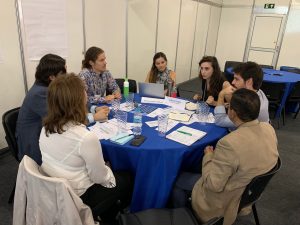
This op-ed was originally published in Portuguese by “A Tarde” newspaper from Salvador, Brazil, on August 19, 2019.
This week, people from all over Latin America gather under the auspices of the United Nations Framework Convention on Climate Change (UNFCCC) in Salvador, Brazil, to discuss—and hopefully act on—the climate crisis we are all experiencing, a crisis that increasingly defines our lives while it simultaneously threatens and destroys the beautiful and delicate world we inhabit.
This situation forces us to address two existential actions.
First, we must adapt to the changes brought about by the new and evolving climatic conditions. Adapting means taking action to maintain our well-being despite the new challenges. Examples of adaptation could include collecting rainwater for use at home to compensate for less water availability or forming neighbourhood groups to collectively protect the elderly from higher temperatures. Adaptation and mitigation (reducing greenhouse gas emissions) are what governments and people around the world are currently doing to try to control the climate crisis.
Second, we must re-imagine a new world for ourselves and for future generations. It will be different than the one our grandparents and our parents grew up in. The climate change we are experiencing is savage and we are all forced to face it, no matter how much or little our individual roles as people or as nations have contributed. Though this change comes with huge feelings of loss, it also gives us the freedom and the responsibility to be part of envisioning a new model.
This new model is collaborative but also confrontational. It has to be, because, despite the climate crisis being an unprecedented emergency, governments and corporations are largely responding as if it were a familiar challenge we have faced before that will be resolved by a few good inventions and improved technologies. Except it won’t.
This new model speaks a new language: it is a sounding board for the voices of young leaders with new visions of how people can live differently and more sustainably. This new language elevates the knowledge of people thus far considered “non-technical” (implying they are not knowledgeable!) and hence unfit to contribute to shaping a new future. This new language is heard in the streets as people make choices to eat less meat, think twice about air travel, protect the environment with small actions like reducing their waste, and behave compassionately.
We need a new model because the old one has expired, and it won’t work in a changing climate. The old model of addressing, and adapting to, the climate crisis has been about prioritizing technological and engineering projects while silencing ideas that posit that the solution is about humans behaving and interacting differently among ourselves and with the environment. That old system, which still reigns, has failed to produce a vision of a future that benefits the majority of people or ecosystems.
It is no surprise, then, that the adaptation actions that result from this paradigm are often one-sided, as they are driven by interests and knowledge that is foreign to the large majority of people. Today’s climate crisis reflects those institutional arrangements and the social and environmental injustices they promote.
Our planet demands deep-rooted change, and that requires everyone’s contributions. Knowledge has many faces and languages, not just those spoken by people and institutions in positions of power. When we talk about solving the climate crisis, we should have more than just a technical lens; we should also be talking about compassion, grief, fear and hope.
Any opinions stated in this blog post are those of the author(s) and do not necessarily reflect the policies or opinions of the NAP Global Network, its funders, or Network participants.